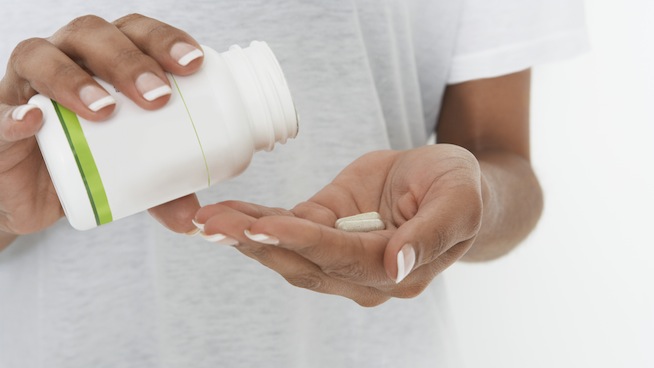![]()
High performance is a goal set by all driven athletes. If you are a “no pain, no gain” kind of player, know that you have access to natural remedies to relieve muscle soreness. Make these simple, safe choices your new team members, supporting your athletic performance and maximizing your recovery. It’s not just about “sports drinks and chill.”
1. Fish Oils
The magic number here is seven. All it takes is seven days of supplementation to amp up the concentration of omega 3’s in the body. Studies show that this increased level reduces post-exercise inflammation. Fish oils stop muscle pain before it starts. If you are worried about aftertaste, go for the lemon-flavored version.
RELATED: 3 Reasons Why You Should Take a Fish Oil Supplement
RELATED: 5 Rules You Must Know Before Taking a Fish Oil Supplement
2. Tumeric

Spice up your game with tumeric, a powerful anti-inflammatory agent. A study published in the Journal of Pain Research demonstrated that taking one gram of tumeric twice a day had a more potent pain-relieving effect than 500 mg of acetaminophen. The benefit for the body is effective pain management and healing for muscle injuries.
3. Magnesium

Feeling tight, sore, crampy or stiff? Magnesium is a mineral our muscles are particularly fond of due to its relaxation properties. Low magnesium levels result in a buildup of lactic acid, causing pain and tightness. You can achieve better flexibility with magnesium supplementation, and elongated muscles are less susceptible to soreness. Stay in the game with magnesium. The Recommended Daily Allowance is 350-400 mg per day.
RELATED: Athletes: Get More Powerful With Magnesium
4. Probiotics
Probiotics are good bacteria that have a variety of health benefits. A handful of studies suggest that a strain of probiotic—bacillus coagulans GBI-30, 6086—reduces muscle damage. GanedenBC30, a specific brand used in a study published by the Journal of The International Society of Sports Nutrition, when consumed with protein, produced positive results for reducing muscle damage, increasing recovery and maintaining athletic performance, even after muscle-damaging exercise. Probiotics and protein are a winning combination for muscle soreness.
RELATED: Do You Need a Probiotic Supplement?
5. Methylsulfonylmethane
More commonly referred to as MSM, this sulfur compound is a popular addition to a healthy lifestyle because of its known benefits for joint health. But it doesn’t stop there. MSM reduces muscle soreness and fatigue by decreasing the production of molecules in the body called cytokines. Cytokines play for “Team Inflammation.” To get the win, use MSM to prevent cytokine levels from rising immediately after exercise—so you can focus on giving it your all.
When we are in our prime, we don’t often think about wear and tear on our bodies. But to reduce the risk of chronic joint and muscle pain, it’s good to form prevention habits early. Fortunately, there are natural ways to deal with muscles soreness, and diet is an important tool for success. Pain shouldn’t have to be part of the game. Consult with a professional about which options will work well for you.
Sources
- Journal of the International Society of Sports Nutrition, 2015, 12:28 doi:10.1186/s12970-015-0089-4.
- Journal of Pain Research. 2013;6:201-5. doi: 10.2147/JPR.S42184. Epub 2013 Mar 8.
- Dean, Carol, The Magnesium Miracle.
- Journal of the International Society of Sports Nutrition, 2015, 12(Suppl 1):P36 doi:10.1186/1550-2783-12-S1-P36.
RECOMMENDED FOR YOU
![]()
High performance is a goal set by all driven athletes. If you are a “no pain, no gain” kind of player, know that you have access to natural remedies to relieve muscle soreness. Make these simple, safe choices your new team members, supporting your athletic performance and maximizing your recovery. It’s not just about “sports drinks and chill.”
1. Fish Oils
The magic number here is seven. All it takes is seven days of supplementation to amp up the concentration of omega 3’s in the body. Studies show that this increased level reduces post-exercise inflammation. Fish oils stop muscle pain before it starts. If you are worried about aftertaste, go for the lemon-flavored version.
RELATED: 3 Reasons Why You Should Take a Fish Oil Supplement
RELATED: 5 Rules You Must Know Before Taking a Fish Oil Supplement
2. Tumeric

Spice up your game with tumeric, a powerful anti-inflammatory agent. A study published in the Journal of Pain Research demonstrated that taking one gram of tumeric twice a day had a more potent pain-relieving effect than 500 mg of acetaminophen. The benefit for the body is effective pain management and healing for muscle injuries.
3. Magnesium

Feeling tight, sore, crampy or stiff? Magnesium is a mineral our muscles are particularly fond of due to its relaxation properties. Low magnesium levels result in a buildup of lactic acid, causing pain and tightness. You can achieve better flexibility with magnesium supplementation, and elongated muscles are less susceptible to soreness. Stay in the game with magnesium. The Recommended Daily Allowance is 350-400 mg per day.
RELATED: Athletes: Get More Powerful With Magnesium
4. Probiotics
Probiotics are good bacteria that have a variety of health benefits. A handful of studies suggest that a strain of probiotic—bacillus coagulans GBI-30, 6086—reduces muscle damage. GanedenBC30, a specific brand used in a study published by the Journal of The International Society of Sports Nutrition, when consumed with protein, produced positive results for reducing muscle damage, increasing recovery and maintaining athletic performance, even after muscle-damaging exercise. Probiotics and protein are a winning combination for muscle soreness.
RELATED: Do You Need a Probiotic Supplement?
5. Methylsulfonylmethane
More commonly referred to as MSM, this sulfur compound is a popular addition to a healthy lifestyle because of its known benefits for joint health. But it doesn’t stop there. MSM reduces muscle soreness and fatigue by decreasing the production of molecules in the body called cytokines. Cytokines play for “Team Inflammation.” To get the win, use MSM to prevent cytokine levels from rising immediately after exercise—so you can focus on giving it your all.
When we are in our prime, we don’t often think about wear and tear on our bodies. But to reduce the risk of chronic joint and muscle pain, it’s good to form prevention habits early. Fortunately, there are natural ways to deal with muscles soreness, and diet is an important tool for success. Pain shouldn’t have to be part of the game. Consult with a professional about which options will work well for you.
Sources
- Journal of the International Society of Sports Nutrition, 2015, 12:28 doi:10.1186/s12970-015-0089-4.
- Journal of Pain Research. 2013;6:201-5. doi: 10.2147/JPR.S42184. Epub 2013 Mar 8.
- Dean, Carol, The Magnesium Miracle.
- Journal of the International Society of Sports Nutrition, 2015, 12(Suppl 1):P36 doi:10.1186/1550-2783-12-S1-P36.













